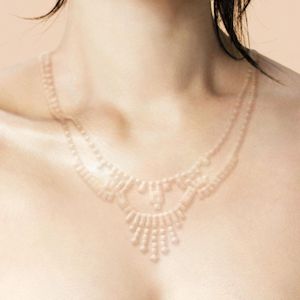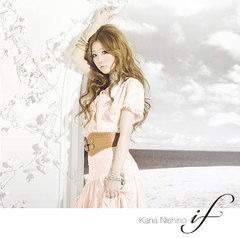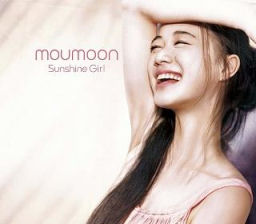
Japanese singer Ayumi Hamasaki has released eighteen studio albums, five compilation albums, twenty-six remix albums, four live albums and numerous singles and promotional singles. She debuted in 1995 under Nippon Columbia with the stage name Ayumi, releasing an extended play Nothing from Nothing, which was a collaboration with Dohzi-T and DJ Bass. Three years later, Hamasaki debuted again as a singer under Avex Trax with the single "Poker Face" (1998). Her first album A Song for ×× (1999) debuted at number one on Oricon's albums chart, and sold over 1.4 million copies.
The solo discography of Japanese musician Yui consists of five studio albums, three compilation albums, twenty-one singles and five video albums. These were released on independent label Leaflet Records in 2004, followed by Sony Music Entertainment Japan sub-label Gr8! Records in 2005, Sony Records between 2005 and 2006, Sony sub-label Studioseven Recordings between 2007 and 2010, before returning to Gr8! Records in 2010.
The discography of Ayaka consists of six studio albums, two compilation albums, a cover album and numerous singles, released through Warner between 2006 and 2009, and through Ayaka's independent label, A Station, from 2012 onwards.

"Come Back to Me" is a pop and R&B song by Japanese American pop singer Hikaru Utada, released under the mononymous moniker Utada. The song was written by Utada and Stargate and was produced by Utada, Stargate and her father, Sking U. "Come Back to Me" is the first single from her second English-language album This Is the One. In the United States, the song has peaked at number five on the Billboard Hot Dance Club Play and number 69 on the Pop 100 chart.

"Ariamaru Tomi" was Japanese singer Shiina Ringo's first single as a solo artist in five years. It was released on May 27, 2009, the same day her debut single was released eleven years earlier. The distributor is EMI Music Japan / Virgin Music.

"Itsu no Hi mo" is a song by Mao Abe. It was released as Abe's third single on 13 January 2010, as the lead single from her second album Pop, two weeks before the album's release.
Hilcrhyme is a Japanese two member hip-hop group. The band's name is a pun on the Japanese pronunciation of hillclimb and the word rhyme. They are best known for their 2009 hit song "Shunkashūtō", which has been certified for 1,000,000 cellphone digital downloads and 1,000,000 ringtone downloads separately. The group was named the New Artist of the Year at the 24th Japan Gold Disc Awards.

Miwa is a Japanese singer-songwriter. She debuted in 2010 with the single "Don't Cry Anymore", which was used as the theme song for the drama Nakanai to Kimeta Hi.
Lil'B is a Japanese female pop duo, consisting of singer Mie and rapper Aila. They debuted in 2008 with "Orange," the 15th ending theme song for the anime Bleach. They are best known for their song "Kimi ni Utatta Love Song," which topped the RIAJ's monthly ringtone chart in 2008. They are also well known for their single "Tsunaida Te", which was the 3rd ending theme song for the anime Fullmetal Alchemist: Brotherhood.

"if" is a song by Japanese singer-songwriter Kana Nishino, released on August 4, 2010 by SME Records as her 11th single.

"Little Girl" is Japanese singer-songwriter miwa's second major label single, released on June 23, 2010. The B-side "Soba ni Itai Kara" is a re-recording of miwa's second independently released single from 2008.

"Butterfly" is a wedding song by Japanese musician Kaela Kimura, released as a digital single on June 1, 2009, roughly a month before her fifth album, Hocus Pocus. It was extremely successful, reaching downloads of over 2,000,000 just over six months after its release. It is Kimura's most successful single digitally. Columbia released a special instrumental version of the song on February 14, 2010.

The discography of Japanese recording artist and actor Masaharu Fukuyama consists of ten studio albums, four compilation albums, three remix albums, twenty video albums, and numerous physical and promotional singles. Fukuyama debuted through BMG Japan by releasing the single "Tsuioku no Ame no Naka" (1990) and the album Dengon. The works failed to chart, however, in 1992 the single "Good Night", aided by the popularity it gained through use in the drama Ai wa Dō da, charted on the Oricon Singles Chart, peaking at number nine. In 1993, his album Calling became his first number one album on the Oricon Albums Chart; it has sold over 850,000 copies in Japan and has been certified two-times platinum by the Recording Industry Association of Japan (RIAJ).

"Sunshine Girl" is Japanese band Moumoon's 8th single, released on May 12, 2010. It achieved success after a high-profile commercial campaign for Shiseido's Anessa range of sunblock cosmetics. It is currently Moumoon's only top 10 single, and their most successful single in terms of physical copies sold and digital certifications.

"Kono Yoru o Tomete yo" is a song by Japanese pop, R&B and jazz musician Juju. It was used as the theme song of the Miho Kanno and Hiroshi Tamaki starring drama Guilty: Akuma to Keiyaku Shita Onna(ギルティ 悪魔と契約した女 ), and was released on November 17, 2010.

"Ai o Komete Hanataba o" is a song by Japanese pop-rock act Superfly. Used as Edison no Haha's theme song, "Ai o Komete Hanataba o" was released as the band's fourth single on February 27, 2008. The song was Superfly's break-through single, breaking into the Oricon physical singles chart's top 20. As of 2011, it is Superfly's most successful single, being certified as a million ringtone download, triple platinum as a cellphone download, and single platinum for digital sales.

The discography of Japanese model-singer Kyary Pamyu Pamyu consists of five studio albums, one extended play, ten singles and six video albums. Kyary Pamyu Pamyu debuted in 2011 under Warner Music Japan sublabel Unborde, as a musician produced by Yasutaka Nakata of the electronic duo Capsule. Kyary Pamyu Pamyu's albums have been released globally, with her seeing international success in Belgium, South Korea and Taiwan.
The discography of Japanese pop singer Kana Nishino consists of seven studio albums, six compilation albums, thirty-four singles and ten video albums. Nishino debuted in 2008 under Sony Music Japan, and gained national recognition with the singles "Tōkutemo" and "Kimi ni Aitaku Naru Kara" (2009). Nishino has released some of the most digitally successful songs in Japan: "Motto..." (2009), "Dear..." (2009), "Best Friend" (2010), "Aitakute Aitakute" (2010), "If" (2010) and "Kimi tte" (2010), all of which were certified million by the RIAJ.

"Tsuretette Tsuretette" is a single by Japanese pop duo Dreams Come True, from their fifteenth studio album, Do You Dreams Come True? (2009), released on November 12, 2009, through Universal Music Japan. The title track was written by the band's singer and songwriter Miwa Yoshida, and produced by Masato Nakamura. The single debuted at number one on the Oricon Singles Chart, becoming the group's first single to top the chart in ten years. It has sold about 86,000 copies in Japan and has been certified Gold by the Recording Industry Association of Japan (RIAJ).

The discography of Japanese musician Miwa consists of six studio albums, one compilation album, seven video albums and twenty-five singles. After releasing two independent singles, Miwa debuted through major label Sony Music Entertainment Japan with the single "Don't Cry Anymore" (2010), a song used as the theme song of the drama Nakanai to Kimeta Hi. The song was commercially successful, and was eventually certified Platinum by the Recording Industry Association of Japan. This song, along with her third single "Change", used as a theme song for the anime Bleach, led her debut album Guitarissimo (2011) to debut at number one on Oricon's album charts.

















